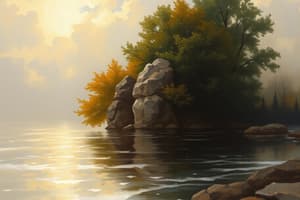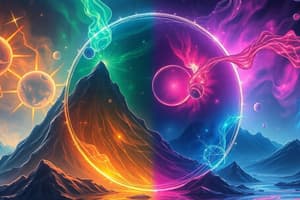Podcast
Questions and Answers
What is the process when water vapor turns into solid directly?
What is the process when water vapor turns into solid directly?
- Evaporation
- Condensation
- Deposition (correct)
- Sublimation
What causes the formation of dew on the ground?
What causes the formation of dew on the ground?
- Deposition of water vapor
- Sublimation of ice
- Evaporation of liquid water
- Condensation of water vapor (correct)
What happens when lakes and rivers freeze in winter?
What happens when lakes and rivers freeze in winter?
- Sublimation takes place rapidly
- A layer of ice forms over liquid water (correct)
- Evaporation increases
- Condensation occurs on the surface
Why does ice float on liquid water?
Why does ice float on liquid water?
What feeds lakes and rivers at lower altitudes, causing growth and renewal?
What feeds lakes and rivers at lower altitudes, causing growth and renewal?
What is a phase change?
What is a phase change?
What determines the phase of a substance?
What determines the phase of a substance?
What happens when a gas loses energy?
What happens when a gas loses energy?
What distinguishes liquids from solids?
What distinguishes liquids from solids?
What happens when a solid gains enough energy?
What happens when a solid gains enough energy?
What is the phase change where a gas turns into a solid, skipping the liquid phase?
What is the phase change where a gas turns into a solid, skipping the liquid phase?
At the critical point, what happens to the boundary between liquid and gas?
At the critical point, what happens to the boundary between liquid and gas?
What is plasma?
What is plasma?
What is the process where a solid goes directly into a gas, skipping the liquid stage?
What is the process where a solid goes directly into a gas, skipping the liquid stage?
What happens to liquids when they reach a certain energy level to become gases?
What happens to liquids when they reach a certain energy level to become gases?
Flashcards are hidden until you start studying
Study Notes
- The triple point is where a substance exists as a solid, liquid, and gas simultaneously. Each substance has its unique triple point.
- The critical point is where the boundary between liquid and gas disappears, and a substance becomes a supercritical liquid at a specific temperature and pressure.
- A phase diagram helps predict the phase of a substance based on temperature and pressure.
- Solids have a definite shape and become liquids when heat energy increases or pressure decreases in a process called melting or liquefaction.
- Liquids become gases (vapor) when they reach a certain energy level, and this process is called boiling.
- Plasma is a state of matter consisting of positive ions and free electrons. It is less common on Earth than other phases, but it is prevalent in the universe.
- Phase change examples: Solids turning into liquids (melting or liquefaction), liquids turning into gases (boiling), gases turning into solids (condensation or deposition), and solids turning directly into gases (sublimation).
- Deposition is a phase change where a gas turns into a solid, skipping the liquid phase.
- Condensation is the opposite of vaporization. Water vapor turns into liquid water when it loses energy and cannot maintain its gaseous state.
- Evaporation is the process where a liquid turns into a gas. It can occur via boiling or simply by molecules gaining enough energy to escape the liquid surface.
- Sublimation is a phase change where a solid goes directly into a gas, skipping the liquid stage. This occurs with substances like dry ice and carbon dioxide.
Studying That Suits You
Use AI to generate personalized quizzes and flashcards to suit your learning preferences.




